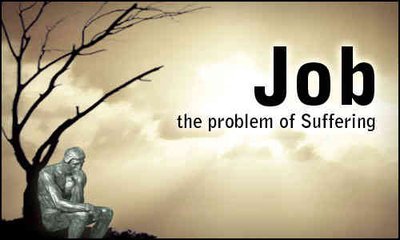Thoughts for the Day
Friday, 4th October 2024: Job: 5
Job 38 and 40 Job Prayer Wisdom Suffering God
Reading : Verses from Job, Chapters 38 and 40

Then the Lord answered Job out of the whirlwind:
‘Have you commanded the morning since your days began,
and caused the dawn to know its place,
so that it might take hold of the skirts of the earth,
and the wicked be shaken out of it?
It is changed like clay under the seal,
and it is dyed like a garment.
Light is withheld from the wicked,
and their uplifted arm is broken.
‘Have you entered into the springs of the sea,
or walked in the recesses of the deep?
Have the gates of death been revealed to you,
or have you seen the gates of deep darkness?
Have you comprehended the expanse of the earth?
Declare, if you know all this.
‘Where is the way to the dwelling of light,
and where is the place of darkness,
that you may take it to its territory
and that you may discern the paths to its home?
Surely you know, for you were born then,
and the number of your days is great!'
Then Job answered the Lord:
‘See, I am of small account; what shall I answer you?
I lay my hand on my mouth.
I have spoken once, and I will not answer;
twice, but will proceed no further.’
(Lectionary, New Revised Standard Version)
Thoughts
Between yesterday's section of Job with his confidence in the Redeemer things have changed (note 19 chapters lie between them!). In the first round of speeches, Job's friends are largely in sympathy with him, and they talk in general terms. In the second set of discussions they speak of the fate of those who are wicked, and they contradict Job's views, indicating that he must have sinned for God to treat him so. The friends cannot believe that a good man could suffer in this way. We can see that Job is honest, but his friends believe him to be arrogant and stubborn. The third round of speeches actually starts with Eliphaz bluntly calling Job a sinner. A new character, Elihu, is finally introduced. His argument as to whether God is just, is more complex but it's unlikely he was in the original text, and he doesn't appear in the conclusion of the book.
Then we come to the final act. We read that 'The Lord answered Job out of the whirlwind'. This must surely remind us of other times God spoke to His people, for instance to Elijah, when he spoke in the silence after a storm, earthquake, and fire (1 Kings 19.11-12). It also reminds us of the terrible incident that started this book - when wind killed Job's children. Now God speaks from another storm.
Job has prepared himself to answer any charges God might make against him, though he hopes that he will simply be declared blameless. However neither happens. Instead God teaches Job, through a study of the complexity of His world, the things that Job has never seen or known. The tone is not meant to make Job feel small or belittled, it is the voice of a friend showing him the wider picture. The beauty of the poetry of these two chapters is worthy looking at again (Job 38-39). Job's response to God's tuition is subdued and humble as he begins to see how God is involved in every part of His creation. He is at once amazed that God has spoken to him, and also perhaps somewhat ashamed at his earlier demands.
Prayer
Lord God,
we too do not understand why the innocent suffer,
we too do not understand why the wicked flourish,
and we too want to ask You questions.
Teach us how to live a life that pleases You,
and to walk with honesty and truth
in all that we do,
thinking always of those whom we can help.
Amen.
You might like to read further about Questioning God, which also touches on Job: